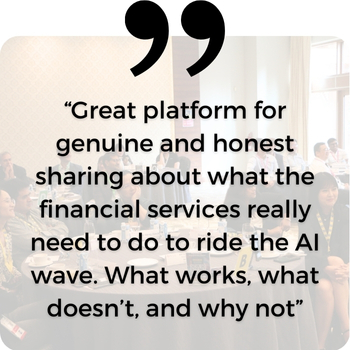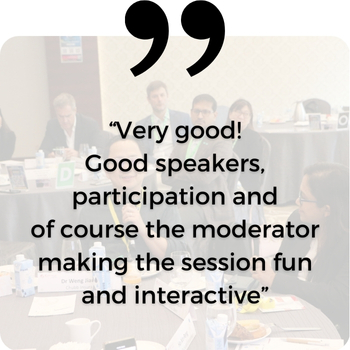
|
Getting your Trinity Audio player ready...
|
The rapid adoption of technological advancements and innovation in Singapore has spurred growth across various sectors, with the financial services industry (FSI) emerging as a frontrunner.
 Recognising the importance of cutting-edge technology in a rapidly evolving digital landscape, the Monetary Authority of Singapore has partnered with banks and tech firms to develop an innovative Artificial Intelligence (AI) risk framework, exploring the multifaceted potential this technology offers the FSI.
Recognising the importance of cutting-edge technology in a rapidly evolving digital landscape, the Monetary Authority of Singapore has partnered with banks and tech firms to develop an innovative Artificial Intelligence (AI) risk framework, exploring the multifaceted potential this technology offers the FSI.
In this dynamic landscape, the use of AI is paramount. Financial institutions are leveraging AI to distil crucial insights from vast datasets, enabling the development of highly financial products, services, and tools. Sectors like banking, trading, and insurance are modernising their operational frameworks with AI, utilising real-time insights to achieve superior outcomes, increased profits, and a competitive edge.
Further, the financial services industry is benefiting significantly from large language models (LLMs) – a specific type of AI algorithm. LLM applications utilise natural language processing (NLP) and machine learning (ML) methods to analyse extensive financial data, extract valuable insights, and facilitate well-informed decision-making. These applications are advantageous in diverse areas such as risk assessment, fraud detection, customer support, compliance, and investment strategies.
 By automating recurring tasks and providing accurate and timely information, LLM applications improve operational efficiency, decrease the chances of human errors, and streamline decision-making processes. This technological advancement empowers financial institutions to stay competitive, adjust to dynamic market conditions, and offer personalised and efficient services to their clients.
By automating recurring tasks and providing accurate and timely information, LLM applications improve operational efficiency, decrease the chances of human errors, and streamline decision-making processes. This technological advancement empowers financial institutions to stay competitive, adjust to dynamic market conditions, and offer personalised and efficient services to their clients.
Despite the significant competitive advantages offered by these advanced technologies, they also pose several challenges. One notable challenge is the integration of AI into the financial services sector, which raises complex issues concerning the security and privacy of data.
Given that the financial services industry deals with susceptible financial information, the use of AI, including LLMs, raises concerns about the safeguarding and confidentiality of this data. Navigating the delicate balance between harnessing the innovation and efficiency offered by AI and the crucial need to bolster defences against evolving threats remains a persistent challenge.
This necessitates continuous investment in security infrastructure, the implementation of rigorous data protection protocols, and strict adherence to regulatory standards, particularly in light of AI’s inherent challenge in the realm of data privacy within the dynamic landscape of the financial services industry.
 Fostering sustainable IT is crucial in the FSI sector to mitigate environmental risks, enhance operational resilience, and align with growing expectations, ensuring long-term economic stability and regulatory compliance. AI is vital in helping organisations achieve sustainable IT through several means, including enhancing efficiency, reducing energy consumption, and optimising resource utilisation.
Fostering sustainable IT is crucial in the FSI sector to mitigate environmental risks, enhance operational resilience, and align with growing expectations, ensuring long-term economic stability and regulatory compliance. AI is vital in helping organisations achieve sustainable IT through several means, including enhancing efficiency, reducing energy consumption, and optimising resource utilisation.
The OpenGov Breakfast Insight held on 22 March 2024 at Equarius Hotel Singapore explored the role of AI in addressing cybersecurity challenges in the financial services industry. The event highlighted the importance of AI in enhancing cybersecurity measures, particularly in detecting and responding to threats in real-time.
The conversation emphasised the vital role of public-private collaboration in crafting resilient cybersecurity strategies, highlighting the necessity of proactive measures and joint initiatives to protect financial institutions from emerging cyber threats amidst the AI-driven transformation. Participants and experts alike recognised the imperative of sharing information and working together to effectively counter cyber threats.
Opening Remarks

Mohit Sagar, CEO and Editor-In-Chief at OpenGov Asia, explained that platforms like OpenGov play a crucial role in enabling governmental bodies to evolve digitally, ensuring that governance is more efficient and accessible to the public.
“This digital shift is imperative as we stand on the cusp of a technological revolution, where the way we live, work, and interact is poised for dramatic changes,” he asserts.
The pandemic has underscored the significance of digital capabilities, thrusting the concept of remote work into the mainstream and accelerating technological advancements at an unprecedented pace.
The term ‘AI’ transitioned from a futuristic buzzword to a daily utility during this period. Towards the end of the crisis, AI technology had become democratised, making information derived from AI not only widely accessible but also remarkably accurate.
This surge in AI utility highlighted its potential in various sectors, notably in the banking and financial sectors, where intelligence and technology have become the primary drivers of differentiation. In an industry where trust is paramount, the integration of AI has opened new avenues for enhancing security, personalising customer experiences, and optimising operational efficiency.
“As we gaze into the future, the transformation powered by AI emerges as a definitive game-changer across all domains, including governance and public services. Yet, this transformation brings to the fore the critical challenges of data privacy and security,” Mohit cautions. “So how can societies become more innovative and efficient without open data sharing?”
The answer lies in navigating this journey with caution and care, underscored by the need for trusted partnerships that respect the delicate balance between leveraging data for advancement and safeguarding individual privacy.
Enhancing cyber resilience amid this AI-driven evolution is paramount. Data represents the lifeblood of our digital existence, akin to the biological imperative that one does not share blood with just anyone except in situations of utmost necessity.
“This analogy underscores the importance of meticulous data management and cybersecurity measures. In the digital age, as we march towards an increasingly AI-integrated future, the emphasis on cyber resilience cannot be overstated,” Mohit explains. “It involves protecting data against unauthorised access and ensuring that the digital ecosystem is robust enough to withstand and recover from any cyber threats or incidents.”
Amidst ongoing market fluctuations, the Financial Services Industry (FSI) finds itself in a transformative phase, compelling organisations to prioritise intelligence, efficiency, and security. With digital innovations reshaping the landscape, FSI entities are embracing advanced technologies like artificial intelligence to remain competitive and address evolving customer needs.
Large Language Models (LLMs), a specialised type of artificial intelligence (AI) algorithm, offer substantial benefits to the financial services industry (FSI). These benefits are crucial in enhancing operational efficiency, improving decision-making processes, and ensuring regulatory compliance:
- Extensive Financial Data Analysis:LLM applications leverage advanced natural language processing (NLP) and machine learning (ML) methods to analyse extensive financial data, providing valuable insights across various domains. These include risk assessment, fraud detection, customer support, compliance, and investment strategies.
- Operational Efficiency and Error Reduction:Automating recurring tasks and delivering timely information by LLM applications improve operational efficiency within the financial sector. By minimising the chances of human errors and streamlining decision-making processes, LLMs enhance overall operational effectiveness, positioning financial institutions to adapt to dynamic market conditions while staying competitive.
- Singapore’s Recognition of Tech Advancements:This collaborative effort reflects the nation’s recognition of the significance of cutting-edge technology, explicitly focusing on exploring the multifaceted potential that AI offers to the financial services industry (FSI).
Despite these benefits, integrating AI into the financial services sector presents challenges, particularly concerning the security and privacy of sensitive financial data. As the industry deals with highly confidential information, concerns arise about how AI technologies handle, safeguard, and ensure the confidentiality of economic data, necessitating a careful balance between innovation and data protection.
AI and ML are pivotal in bolstering cyber resilience within the Financial Services Industry. These advanced technologies can analyse vast amounts of data in real-time, enabling early detection of cyber threats and vulnerabilities, thus enhancing the industry’s ability to address security challenges proactively.
Mohit believes that fostering sustainable IT is imperative in the FSI sector to address environmental risks, enhance operational resilience, and align with rising expectations for corporate responsibility.
AI is crucial in helping FSI organisations achieve sustainable IT, he says. Prioritising sustainable IT practices contributes to long-term economic stability and ensures compliance with evolving environmental regulations, reflecting the industry’s commitment to environmental stewardship.
“Singapore’s commitment to technological innovation and the adoption of advanced technologies like AI have positioned the financial services industry for continued growth and competitiveness,” Mohit concluded. “However, addressing cybersecurity challenges and ensuring the responsible use of AI remain critical priorities for the industry as it navigates an increasingly digital landscape.”
Welcome Address

Singapore’s Financial Services Industry (FSI) has seen remarkable growth year after year, notes John Ng, Director & General Manager of Sales at Hewlett Packard Enterprise. With its substantial contribution to the economy and reputation as a global financial hub boasting diverse institutions, Singapore has cemented its position as one of the top five fintech hubs worldwide. The country is home to over 1,000 fintech firms and attracted a record US$1 billion worth of investments in 2019.
The Singapore government’s commitment to supporting technology adoption, innovation-driven growth, and cybersecurity capabilities has further enhanced the capabilities of existing firms and led to the creation of new industry sectors, such as digital banks and mobile payment providers. Over the past five years, the government has committed over US$250 million to these initiatives, contributing to Singapore’s status as a leading fintech hub.
Artificial Intelligence (AI) has played an increasingly integral role in the FSI sector in Singapore, mainly through the adoption of Large Language Models (LLMs) and Natural Language Processing (NLP). These technologies have been leveraged to enhance various aspects of the industry, including fraud detection, risk assessment, customer service, regulatory compliance, and predictive analytics.
LLMs and NLP analyse large volumes of data to detect fraudulent activities, assess credit risk, improve customer service through chatbots and virtual assistants, ensure regulatory compliance, and predict financial trends and market conditions. These technologies enable financial institutions to make more informed decisions, improve operational efficiency, and stay ahead of the competition.
Hewlett Packard Enterprise (HPE) can assist Singapore’s Financial Services Industry (FSI) sector. He underscores the significance of HPE GreenLake for Large Language Models (LLMs), a cloud service facilitating businesses of varying scales to train, refine, and implement machine learning models. Leveraging HPE’s Cray XD supercomputer, this service delivers an AI software suite, including the HPE Machine Learning Development Environment, to simplify the remote training and deployment of machine learning applications.
Deploying HPE’s supercomputers and AI software, organisations can efficiently train large language models for critical applications in various industries, including finance, healthcare, and legal services. This technology enables businesses to unlock new insights, improve decision-making processes, and drive innovation in their respective industries.
John observes that Singapore’s Financial Services Industry (FSI) sector flourishes due to its dedication to innovation and technology integration. He agrees that the government’s backing of fintech and cybersecurity endeavours has fostered an environment conducive to industry advancement and innovation.
“HPE firmly believes that by embracing AI technologies like LLMs and NLP, Singapore’s FSI sector is primed for continued growth and innovation, solidifying its status as a leading global financial hub,” he concluded. “I an confident that we will get a lot of insights from this meeting that can be implemented in your respective fields.”
Power Talk: How Can FSI Organisations Safeguard AI Capabilities for a Competitive Advantage in the Ever-Evolving Digital Landscape?

As the Executive Director of Data Science at OCBC Bank, Enguerran Dallet has seen the significant potential of artificial intelligence (AI) in the financial services industry (FSI), driving its transformative stages amid market fluctuations.
AI’s advanced capabilities empower FSI entities to modernise operations and secure a competitive edge in the evolving digital landscape.
However, challenges, particularly regarding data privacy and security, persist. Enguerran proposes several strategies and considerations to effectively harness AI and data within Singapore’s Financial Services Industry:
- Data Security: Implement strong data security measures and identity and access management (IAM) protocols to protect customer data.
- Data Quality and Infrastructure: Clean and structure data to mitigate risks and lay a foundation for AI applications.
- Expert Partnerships: Collaborate with third-party experts to bridge technical expertise gaps.
- Comprehensive Assessment: Assess current capabilities thoroughly to identify improvement areas.
- Ethical AI: Emphasise responsible AI practices, ethical considerations, and algorithmic transparency.
- Regulatory Compliance: Implement AI-powered RegTech solutions for compliance.
Implementing these strategies can help Singapore’s financial institutions leverage AI and data effectively, drive innovation, enhance decision-making, and achieve superior outcomes in the FSI sector.
“In today’s highly competitive financial services industry, personalisation is not just a strategy but a necessity for achieving customer satisfaction, loyalty, and overall business success,” believes Enguerran. “Personalisation allows institutions to go beyond generic offerings and tailor products, services, and interactions to meet individual customers’ unique needs and preferences, thereby building trust and loyalty.”
Enguerran acknowledges that AI plays a pivotal role in enabling this level of personalisation. In OCBC Bank, AI-powered algorithms can analyse our vast customer data, including their transaction history, browsing their behaviour, and even their demographic information, to gain valuable insights into their preferences and behaviour, elaborates Enguerran. This kind of analysis allows institutions to provide personalised recommendations, offers, and services that are more likely to resonate with customers, enhancing their overall experience.
One of the key areas where AI is transforming personalisation in the financial services industry is using chatbots and virtual assistants. These AI-powered tools can interact with customers in real-time, providing personalised support and assistance based on individual needs. This improves customer service and frees human agents to focus on more complex tasks, improving overall efficiency and productivity.
By leveraging AI, financial institutions can differentiate themselves, attract new customers, and retain existing ones. AI’s ability to analyse data, predict customer behaviour, and optimise operations leads to increased efficiency, reduced costs, and improved customer satisfaction.
“AI-driven personalisation is key in today’s financial services industry. It enables institutions to meet customer expectations, stay competitive, and drive business growth in a rapidly evolving digital landscape,” ends Enguerran.

David Sharratt, Global Head of Data Product Monetisation at Standard Chartered Bank, highlights the transformative impact of technological advancements on financial services. Over the past few decades, these advancements have reshaped how people interact with money and what they expect from financial institutions, leading to simplified processes, reduced error rates, improved communication, and altered consumer perceptions of money.
Financial organisations are poised to benefit significantly from these advancements, particularly through chatbots and automation. David emphasised that these innovations can reduce labour hours, enhance client connections, and boost profitability. The impact of these technologies varies across functions, but many institutions can adapt and gain from them.
One such transformative technology is blockchain, a digital ledger of transactions distributed across a network of computers and secured through cryptography, David explains. Initially designed for tracking digital currency, blockchain has the potential to revolutionise aspects of the financial services industry. For example, it can streamline processes involved in executing and clearing securities trades, reducing costs and errors associated with manual bookkeeping.
“Artificial Intelligence and Machine Learning have also led to significant improvements in financial services by helping banks automate processes and make informed decisions,” asserts David. “AI is used to identify fraud and illegal activity, while ML helps banks develop new products and services. Based on my experience, those technologies reduce costs and improve the customer experience.”
Cloud banking is another significant trend, enabling institutions to store and process financial data in remote locations. This cost-efficient approach allows access to robust technologies from anywhere in the world.
Embedded finance is a technology that improves the efficiency of financial services, potentially reducing costs for banks by automating processes. RPA automates tasks and processes, reducing manual work and improving organisational efficiency.
“However, these technologies also pose cybersecurity risks,” he warns. “Despite we know that technology is emerging anywhere, we have to be aware of its risk too.”
To safeguard data against threats and ensure data availability, businesses should implement robust security measures, conduct regular security audits, and provide data security in AI systems. Compliance with regulations, employee awareness, diverse dataset testing, error analysis, and backup and disaster recovery plans are essential for protecting sensitive data.

Amit Krishna, General Manager, Compute Southeast Asia at Hewlett Packard Enterprise (HPE), emphasised the company’s readiness to support the financial services industry (FSI) sector in overcoming its technological challenges. HPE offers a range of innovative solutions tailored to the specific needs of the FSI sector, with a focus on enhancing data security, automation, and operational efficiency.
One of HPE’s flagship solutions is GreenLake for Large Language Models (LLMs). This cutting-edge cloud service empowers businesses to train, fine-tune, and easily deploy machine learning models. This service, powered by HPE’s Cray XD supercomputer, provides a comprehensive AI software stack to streamline machine learning application training and deployment processes.
“Organisations can efficiently train large language models for critical applications across various industries, including finance,” believed Amit.
HPE also implements robust security measures to safeguard sensitive financial data. As AI and machine learning adoption continues to grow within the FSI sector, ensuring data security and compliance with regulations becomes increasingly vital.
“HPE’s security solutions, which include encryption, multi-factor authentication, and secure development practices, are tailored to help organisations mitigate cybersecurity risks associated with AI systems,” he reveals.
Moreover, HPE’s technologies enhance operational efficiency and customer service for financial institutions. For instance, HPE’s AI-powered solutions enable the development of chatbots and virtual assistants that improve customer interactions and reduce costs by minimising the need for human intervention in routine banking processes.
These technologies also enable financial institutions to gain deeper insights into customer behaviour and market trends, empowering them to make more informed decisions and maintain a competitive edge in the market.
“HPE’s innovative solutions and expertise can deliver significant benefits to the FSI sector, addressing key challenges and unlocking new opportunities for growth and efficiency,” Amit concluded. “By leveraging HPE’s technologies, financial institutions can enhance their competitiveness and deliver superior services to their customers in today’s rapidly evolving digital landscape.”
Closing Remarks
John Ng expressed gratitude for the participants’ enthusiasm during the session, considering it the beginning of their journey to explore various ideas and innovations poised to reshape the financial industry. He acknowledges the importance of collaboration among companies and stakeholders in fostering innovative and sustainable solutions.
A key topic of discussion centered around the incorporation of AI technology into Singapore’s Financial Services Industry (FSI), with John reaffirming HPE’s commitment to aiding the sector in overcoming its technological challenges. HPE stands prepared to offer customised solutions tailored to meet the distinctive needs of the FSI, particularly focusing on aspects like data security, automation, and operational efficiency.
HPE offers the GreenLake for Large Language Models (LLMs) solution, a cloud service that allows businesses to train, tune, and deploy machine learning models. Powered by HPE’s Cray XD supercomputer, this service provides an AI software stack that simplifies the training and deployment of machine learning applications. By leveraging HPE’s supercomputers and AI software, organisations can train large language models for critical applications in various industries, including finance.
Additionally, HPE provides expertise in implementing robust security measures to protect sensitive financial data. With the increasing use of AI and machine learning in the FSI sector, ensuring data security and regulation compliance is crucial. HPE’s security solutions, including encryption, multi-factor authentication, and secure development practices, can help organisations reduce cybersecurity risks associated with AI systems.
John encouraged experts, professionals, and all participants present to embrace the integration of AI into their operations to enhance efficiency, innovation, and customer experience. He also stressed the importance of adopting a sustainable approach to AI implementation, prioritising factors such as data security and regulatory compliance.
Given the elevated cyber risks in the field, companies must safeguard their data against threats and ensure data availability, especially when deploying cutting-edge technologies like AI, is John’s advice. But despite the risks involved, companies in the financial sector must be prepared to adapt to the rapid changes in the technology landscape, with AI emerging as a crucial tool for maintaining competitiveness in this digital era.
“By implementing AI technology wisely and responsibly, companies can optimise their operations, enhance data-driven decision-making, and deliver superior customer service,” John concludes.
















